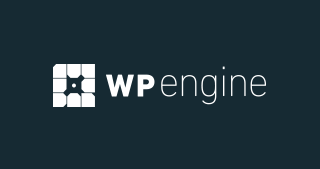In today’s world, where continuous learning is key to personal and professional growth, online education platforms like Coursera and Udemy have become essential.
Both platforms offer thousands of courses covering various subjects, from technology and business to arts and personal development.
However, choosing the right platform for your learning journey can be difficult due to the unique features, pricing models, and course quality of each.
This comprehensive post compares Coursera and Udemy based on their features, course offerings, pricing, and value.
By the end, you’ll have a clearer understanding of which platform is the best fit for your educational and career goals.
Online learning has experienced exponential growth in recent years. With the rise of platforms like Coursera and Udemy, learners now have the flexibility to acquire new skills, earn certificates, and even pursue degrees—all from the comfort of their homes.
Coursera and Udemy are two of the most popular online learning platforms, each offering something different to their users.
Coursera focuses on providing high-quality, university-backed education, while Udemy offers a vast library of courses taught by independent instructors.
In this detailed comparison, we’ll explore the strengths and weaknesses of both platforms, helping you decide which one better aligns with your needs.
Overview of Coursera and Udemy
Overview of Coursera

Coursera is an online learning platform founded in 2012 by two Stanford professors. It partners with top universities and organizations, offering courses, specializations, professional certificates, and degree programs.
Coursera is known for its rigorous academic content, and its courses are often taught by professors from leading universities like Yale, Stanford, and the University of Michigan.
Coursera’s mission is to provide access to high-quality education for learners across the globe. Whether you are a beginner looking to upskill or a professional seeking an accredited degree, Coursera offers a range of learning opportunities that can help you meet your career or academic goals.
Overview of Udemy
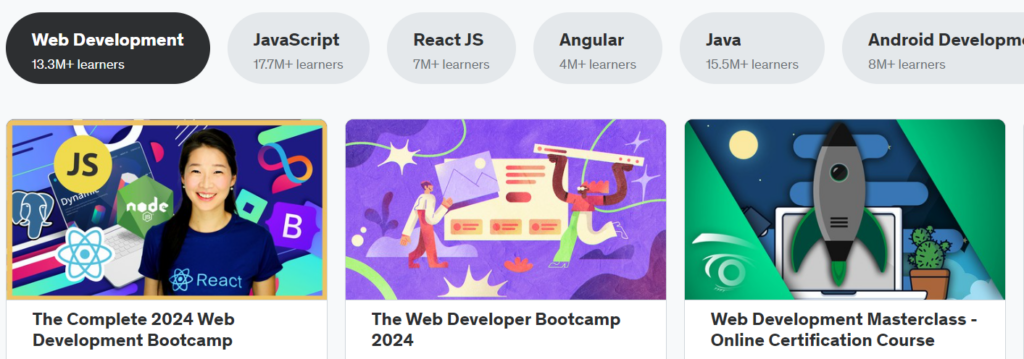
Udemy is a global online learning platform launched in 2010 that provides a wide array of courses on just about any subject.
Unlike Coursera, Udemy does not partner with universities. Instead, its courses are created by independent instructors, making the platform more flexible and diverse in terms of teaching styles, topics, and pricing.
Udemy is aimed at learners who want to gain practical, job-ready skills, whether it’s coding, photography, marketing, or even personal development.
The platform boasts over 200,000 courses, making it one of the most extensive online learning libraries. Udemy’s courses are usually more affordable than those on Coursera, and the platform frequently runs discounts and promotions, making learning accessible to all.
Features of Coursera and Udemy
Features of Coursera

1. Accredited Courses and Degrees
One of Coursera’s standout features is its partnership with top universities and institutions, providing accredited courses, certificates, and degrees.
Learners can take courses from prestigious schools like Stanford, Yale, and Duke, and many of these courses count towards professional certificates or even full degrees. This makes Coursera an excellent choice for those who want formal credentials that can boost their resume.
Coursera’s degree programs, such as Master’s in Business Administration (MBA) or Data Science degrees, offer the same level of education as on-campus programs, but with the flexibility of online learning. These accredited programs are ideal for learners who want to gain a competitive edge in the job market.
2. Specializations and Professional Certificates
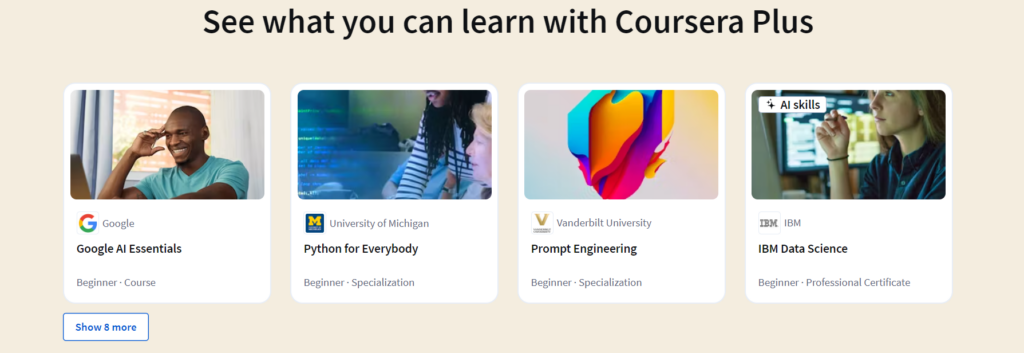
Coursera offers specializations, which are a series of related courses designed to help learners master a specific skill or subject. Specializations typically end with a capstone project, allowing learners to apply what they’ve learned in a practical setting.
These specializations often lead to professional certificates, which are highly valued by employers and can significantly improve job prospects.
Coursera’s professional certificates are created in partnership with industry leaders like Google, IBM, and Salesforce, making them highly relevant for today’s tech-driven job market.
These certificates are an excellent option for learners who want to gain job-ready skills without committing to a full degree.
3. High-Quality Course Material
Since Coursera partners with universities and institutions, the quality of its courses is exceptionally high. Courses are often structured similarly to traditional university courses, with video lectures, reading materials, quizzes, assignments, and peer-reviewed projects.
Coursera’s instructors are typically professors or professionals with significant expertise in their fields.
This focus on academic rigor makes Coursera an excellent platform for learners who value quality and are looking for well-structured, comprehensive courses.

4. Flexible Learning Options
Coursera allows learners to study at their own pace. Although courses have suggested deadlines, learners can adjust the schedule according to their availability.
This flexibility makes it easy to balance work, study, and personal commitments. Coursera also offers mobile learning through its app, enabling users to download course materials and study offline.
5. Financial Aid and Scholarships
Coursera offers financial aid and scholarships to learners who cannot afford the cost of paid courses or degree programs.
This makes it accessible to a global audience, regardless of financial constraints. The application process is simple, and many students have benefited from these opportunities to pursue their educational goals.
Features of Udemy

1. Diverse Course Offerings
Udemy boasts one of the largest libraries of online courses, with over 200,000 courses on virtually any subject. Whether you’re looking to learn technical skills like programming or personal skills like photography, Udemy has a course for you.
Since the platform allows independent instructors to create courses, learners have access to a diverse range of teaching styles and content.
This vast course selection is one of Udemy’s major strengths. No matter what you want to learn, you’re likely to find it on Udemy, whether it’s a niche hobby or a job-ready skill.
2. Affordable Pricing and Frequent Discounts
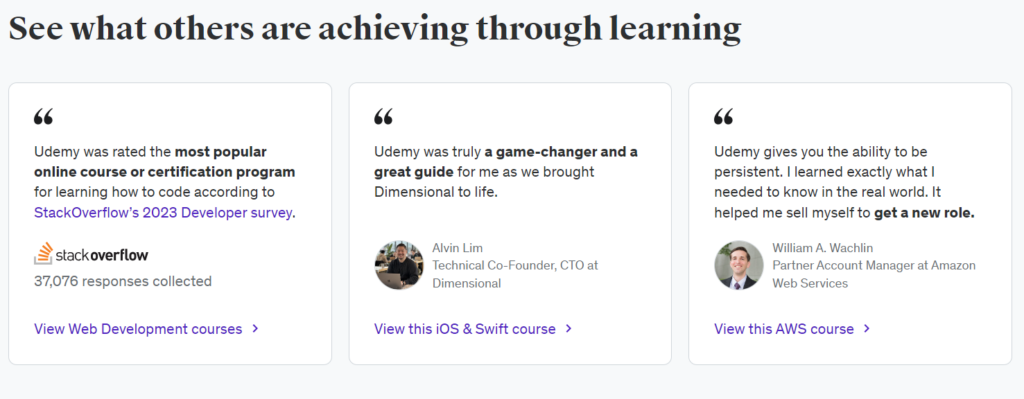
Udemy courses are usually priced much lower than those on Coursera, and the platform frequently offers significant discounts and promotions. It’s not uncommon to find a course priced at $100 discounted to $15 during sales, making Udemy a highly affordable option for learners on a budget.
This pricing model makes it accessible for people who want to take multiple courses without breaking the bank.
Additionally, Udemy offers lifetime access to the courses you purchase, so you can revisit the material whenever you need it.
3. Course Creation by Independent Instructors
Udemy allows anyone with knowledge in a particular field to create and publish a course, which results in a wide variety of content.
Instructors range from industry professionals and experts to hobbyists and educators. While this opens up a world of learning possibilities, the quality of courses can vary significantly from one instructor to another.
Udemy’s user rating system helps learners evaluate courses before purchasing. Students can see reviews and ratings, allowing them to choose courses with high satisfaction rates.
4. Practical, Job-Ready Skills

Unlike Coursera, which focuses more on academic subjects, Udemy offers many courses geared toward practical skills. From coding boot camps to digital marketing workshops, Udemy courses often prioritize hands-on learning and real-world applications.
This makes Udemy an excellent platform for learners who want to acquire job-ready skills quickly.
Udemy’s courses tend to be shorter and more flexible, allowing learners to gain specific skills without committing to a long-term program. Many courses also provide downloadable resources, quizzes, and assignments to reinforce learning.
5. No Accreditation or Formal Degrees
One of Udemy’s main limitations is that its courses are not accredited, and the platform does not offer formal degrees. While many Udemy courses provide certificates of completion, these are not recognized by universities or employers in the same way that Coursera’s certificates are.
However, for learners who are more interested in gaining practical skills and knowledge than in earning formal credentials, Udemy still offers a valuable learning experience.
Pricing: Coursera vs. Udemy
Coursera Pricing
- Individual Courses: Many Coursera courses can be audited for free, but to earn a certificate, courses typically cost between $29 and $99. Learners also have the option to subscribe to certain courses for access to quizzes, assignments, and certificates.
- Specializations and Professional Certificates: Coursera’s specializations and professional certificates are subscription-based, with costs ranging from $39 to $79 per month. The subscription gives learners access to all the courses in a specialization.
- Degree Programs: Coursera offers fully accredited degree programs ranging in price from $9,000 to $25,000, depending on the program and the institution. These degrees are equivalent to traditional on-campus degrees.
- Coursera Plus: For $399 per year, learners can access Coursera Plus, which provides unlimited access to over 7,000 courses and specializations. This option is ideal for those who want to take multiple courses throughout the year.
Udemy Pricing
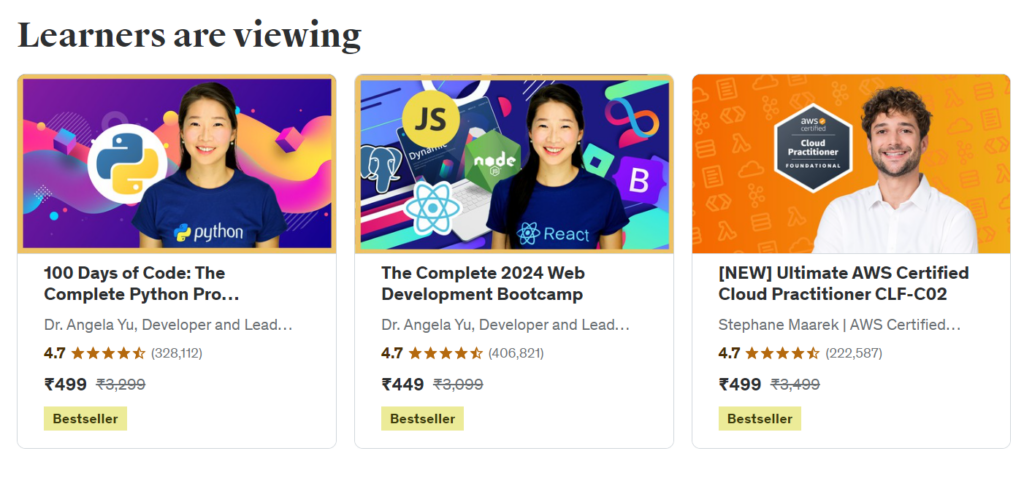
- Individual Courses: Udemy courses are priced individually and typically range from $10 to $200. However, frequent sales and promotions allow learners to purchase courses at a fraction of the listed price, sometimes as low as $10 or $15.
- Free Courses: Udemy also offers a selection of free courses. However, these are often limited in scope and do not come with certificates of completion.
- Lifetime Access: Once purchased, Udemy courses provide lifetime access, meaning learners can revisit course material whenever they need it. There are no subscription fees or recurring charges for most courses.
FAQ: Coursera vs. Udemy
Is Coursera accredited?
Yes, Coursera offers accredited courses and degrees from top universities.
Are Udemy courses accredited?
No, Udemy courses are not accredited, but they provide valuable skills for personal and professional growth.
Can I access courses for free on Coursera?
Yes, Coursera allows users to audit many courses for free, but to earn certificates, a fee is required.
Can I access courses for free on Udemy?
Udemy offers some free courses, but most are paid. Discounts and promotions frequently reduce the price significantly.
Which platform offers certificates?
Both Coursera and Udemy offer certificates. However, Coursera’s certificates are accredited and often recognized by employers, while Udemy’s certificates are not.
Which platform is better for professional development?
Coursera is better for learners seeking formal education and accredited certificates. Udemy is better for those looking to gain practical, job-ready skills quickly.
Conclusion
When comparing Coursera and Udemy, it’s clear that both platforms offer unique advantages depending on what you’re looking for.
Coursera is ideal for learners seeking high-quality, accredited education from leading universities. Its courses, specializations, and degree programs are well-suited for professionals who need formal credentials and want to invest in long-term career growth.
The academic rigor, combined with partnerships with top institutions, makes Coursera a valuable platform for serious learners.
On the other hand, Udemy is perfect for learners who want to acquire practical skills quickly and affordably. Its vast library of courses offers something for everyone, and the frequent discounts make it an appealing option for budget-conscious learners.
While Udemy doesn’t offer accredited certificates or degrees, it’s an excellent platform for personal development, hobby learning, and acquiring job-ready skills.
In conclusion, the best platform for you depends on your specific learning goals. If you’re looking for formal education and recognized certificates, Coursera is the better option. However, if you’re more interested in flexible, affordable learning for practical skills, Udemy is likely the better choice.


